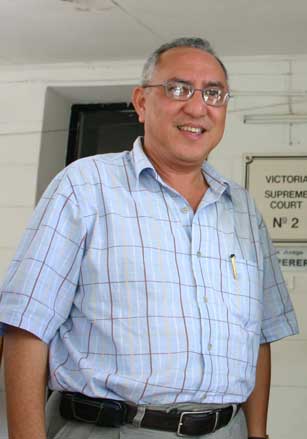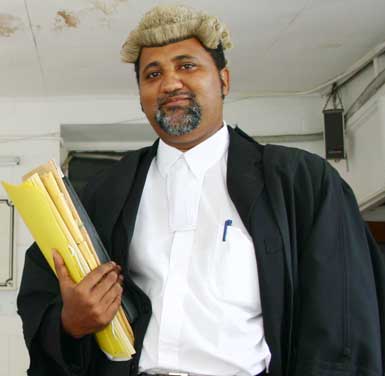

SEYCHELLES IN CONSTITUTIONAL IMPASSE
CHOW CHALLENGES ELECTORAL COMMISSIONER’S ELECTION DATES IN CONSITUTIONAL COURT

The country is in a serious constitutional bind this week following a legal challenge to the Electoral Commissioner’s decision to set the date of the elections for the 10th, 11th and 12th May.
The constitutional challenge was brought by the leader of the Democratic Party, Mr
The Constitutional Court was composed of Supreme Court Judges Karunakaran, Perera (chairing) and Gaswaga, all of whom are foreigners. Many questioned why Judge Bernadin Renaud, a Seychellois, was not chosen to form part of the trio of judges, especially since Mr Renaud was the chairman of the Constitutional Commission which drafted the Constitution in 1993. According to the Constitution the Constitutional Court must be composed of three judges of the Supreme Court.

Arguing the case for the Democratic Party leader, lawyer Mr
The President used the provision of Article 110 of the Constitution to issue his proclamation. Article 110, Mr Elizabeth argued, only empowers the President to dissolve the National Assembly if “in his opinion, it is in the national interest to do so.” This is not in dispute.
But Article 81 of the Constitution also says that “a person ceases to be a member of the National Assembly and the seat occupied by that person shall become vacant – on the dissolution of the Assembly”. This state of affairs, Mr Elizabeth argued, triggers the provisions of Article 79 (2) of the Constitution which states unambiguously, “Where a person ceases to be a directly elected member of the National Assembly under article 81, a by-election shall be held within 30 days of the person ceasing to be a member of the Assembly…”
In reply to the petition, Attorney General, Mr Anthony Fernando, argued that the election was called under the Elections Act which provides for 90 days after the dissolution for a general election to be held. But Mr Elizabeth argued that the proper law under which this election should be held is the Constitution – which is the Supreme law, not the Elections Act, which in any event cannot be allowed to contradict the Constitution.
Mr Elizabeth also pointed out that under the Constitution, as it has been written, there is only one instance when a general election is held and that is when the Assembly has reached the end of its 5 year mandate. This is provided for under Article 79(1), which also allows for an election for a successor to the outgoing National Assembly to be held as from the beginning of the 57th month to the end of the 59th month of the life of the outgoing Assembly. In this case a general election could have been properly called only between September and November. In this instance, the Constitution, under Article 106(2)(b), the National Assembly which is being replaced “shall stand dissolved” on the day after the “declaration of the results of the election”.
The legal arguments, however, brought out an apparent deficiency in the Constitution as it makes no provision for the election of “proportionally elected members” when a by-election is held – which can change the proportion of votes a political party accumulates from that which it obtained originally in a general election. The Constitution provides (Schedule 4) for “proportionally elected” members to be nominated by a political party based on the proportion of votes that a party had accumulated in a general election. Mr Elizabeth argued that the only legal and constitutional way to proceed is to amend the Constitution rather than to circumvent it, as the Electoral Commissioner is planning to do, which will be challenged in the Constitutional Court.
The case elicited wide interest among the legal fraternity, which saw almost every lawyer in Seychelles present to hear the legal arguments. The proceedings at one time saw very heated arguments between the Attorney General and Mr Elizabeth. The tactic adopted by the Attorney General was to ask the Constitutional Court to throw the case out without hearing it on its merit because of what he claimed were “mistakes” in the drafting of the petition. As a fall back position the Attorney General also argued under Article 130 of the Constitution, even if it is argued that the Constitution has been contravened, Mr Chow’s interest is not being affected or is likely to be affected by such contravention. Therefore, he said, Mr Chow has no local standing to bring the petition under Article 130 of the Constitution.
However, the Attorney General’s strategy was dealt a body blow after the Court agreed to allow the petition to be amended by the petitioner to correct the “mistakes”, as well as to hear both the Attorney General’s objections and the merit of the case at the same time. This move has clearly put the Constitutional Court in a quandary, according to many lawyers. If it finds that constitutional arguments put forward by Mr Elizabeth to be correct it would admit that the Constitution had been contravened even though it may feel that the petitioner’s “interest” has not “been” or is not “likely to be affected”. In any event, Mr Elizabeth argued, his client was not seeking “redress”, which is what article 130 of the Constitution provides for, only a ruling on the constitutional legality of the decision of the Electoral Commissioner to hold the elections within 50 days of the dissolution proclamation rather than within 30 days as the Constitution mandates.
The decision of the Constitutional Court, most observers believe, will have wide repercussions either way, as it would place the country in a constitutional crisis. It would literally mean that President Michel – with the advice of the Attorney General, has, by the stroke of a pen, made it constitutionally impossible for an election to be held to elect a National Assembly. This state of affairs is the direct result of President Michel, in collusion with the Attorney General, the National Assembly Speaker Francis MacGregor and Hendrix Gappy, the Electoral Commissioner, to win cheap political points over the opposition in a clear violation of the spirit of our Constitution. In so doing, one observer opined, President Michel has done the constitutional equivalent of checkmating himself. Does that mean that Mr Michel’s administration is incompetent to govern the country?